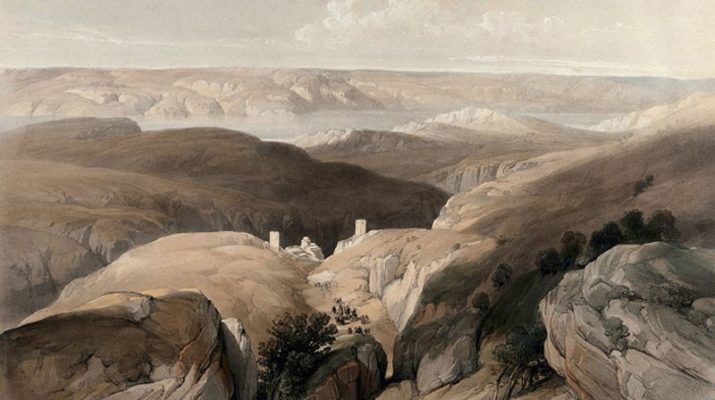John 1:6-8, 19-28
Advent B3
6 There wasA a manB sentC from God,D whose nameE was John.F
A “was” = ginomai. This is to come into being, to happen, become, be born. It can be to emerge from one state or condition to another or is coming into being with the sense of movement or growth.
B “man” = anthropos. Probably from aner (man, male, husband) + ops (eye, face). This is human, humankind. Used for all genders.
C “sent” = apostello. From apo (from, away from) + stello (to send, set, arrange, prepare, gather up); {probably from histemi (to make to stand, stand, place, set up, establish, appoint, stand firm, be steadfast)}. This is to send forth, send away, dismiss, send as a messenger. It implies one that is sent for a particular mission or purpose rather than a quick errand. This is where “apostle” comes from.
D “God” = theos. From Proto-Indo-European origins, meaning do, put, place. This is God or a god in general.
E “name” = onoma. May be from ginosko (know, recognize, learn from firsthand experience). This is a name, authority, cause, character, fame, reputation. The name was thought to include something of the essence of the person so it was not thought to be separate from the person.
F “John” = Ioannes. From Hebrew yochanan (Johanan); from Yehochanan (“the Lord has been gracious”); {from YHVH (proper name of the God of Israel); {from havah (to become); from hayah (to be, exist, happen)} + chanan (beseech, show favor, be gracious; properly, to bend in kindness to someone with less status). This is John.
7 He came as a witnessG to testifyH to the light,I so that all might believeJ through him. 8 He himself was not the light, but he came to testify to the light.
G “witness” = marturia. From martureo (to bear witness, testify, give evidence; to testify in a literal or figurative sense); from martus (a witness whether having heard or seen something; witness literally, judicially, or figuratively; by analogy, a martyr). This is testimony, witness, evidence, record, reputation.
H “testify” = martureo. Related to “witness” in v7. See note G above.
I “light” = phos. From phao (to shine or make visible, especially with rays of light); from the same as phaino (to bring light, cause to appear, shine, become visible or clear). This is light, a source of light, fire, or radiance. This is light with specific reference to what it reveals. It is luminousness whether natural or artificial, abstract or concrete, literal or figurative.
J “believe” = pisteuo. From pistis (faith, faithfulness, belief, trust, confidence; to be persuaded or come to trust); from peitho (to have confidence, urge, be persuaded, agree, assure, believe, have confidence, trust). This is to believe, entrust, have faith it, affirm, have confidence in. This is less to do with a series of beliefs or doctrines that one believes and more to do with faithfulness, loyalty, and fidelity. It is trusting and then acting based on that trust.
19 This is the testimonyK given by John when the JewsL sent priestsM and LevitesN from JerusalemO to askP him, “Who are you?”
K “testimony” = marturia. Same as “testify” in v7. See note H above.
L “Jews” = Ioudaios. From Ioudas (Judah, Juadas); from Hebrew Yehudah (Judah, son of Jacob, his tribal descendants, a name for the southern kingdom. Literally, it means praised); probably from yadah (to throw one’s hands into the air in a gesture of praise); from yad (hand). This is Jewish, a Jew, or Judea.
M “priests” = hiereus. From hieros (sacred, something sacred, temple, holy, set apart; something consecrated to God or a god). This is a priest, used for Jewish and Gentile priests.
N “Levites” = Leuites. 3x in NT. From Leui (Levi, the tribe or a name); from Hebrew Levi (Levi, or the tribe of Levi). This is someone descended from Levi who assists priests.
O “Jerusalem” = Hierosoluma. From Hebrew yerushalaim (probably foundation of peace); {from yarah (to throw, shoot, be stunned; to flow as water so figuratively to instruct or teach) + shalem (to make amends, to be complete or sound)}. This is Jerusalem, dwelling of peace.
P “ask” = erotao. From eromai (to ask) OR from ereo (to say, tell, call, speak of). This is asking a question or making an earnest request. It is used between someone with whom the asker is close in some sense. So, they anticipate special consideration for their request.
20 He confessedQ and did not denyR it, but confessed, “I am not the Messiah.”S
21 And they asked him, “What then? Are you Elijah?”T
He said, “I am not.”
“Are you the prophet?”U
He answered, “No.”
Q “confessed” = homologeo. From homologos (of one mind); {from homos (the same) + lego (to say, speak, tell)}. This is to agree, speak the same, declare, promise, praise, celebrate. It can mean to align with, express the same conclusion, endorse.
R “deny” = arneomai. From a (not) + rheo (say, speak of). This is to deny, disown, refuse, repudiate someone or a previously held belief, to contradict.
S “Messiah” = christos. From chrio (consecrate by anointing with oil; often done for prophets, priests, or kings). Literally, the anointed one, Christ. The Greek word for Messiah.
T “Elijah” = Elias. Related to “John” in v6. From Hebrew Eliyyah (Elijah) {from el (God, god) + Yah (the shortened form of the name of the God of Israel; God, Lord); {from YHVH (see note F above)}. This is Elijah, “The Lord is God.”
U “prophet” = prophetes. From pro (before, in front of, earlier than) + phemi (to declare, say, use contrasts in speaking to shed light on one point of view); {from phao (to shine) or phaino (to bring light, cause to appear, shine, become visible or clear)}. This is a prophet or poet – one who speaks with inspiration from God.
22 Then they said to him, “Who are you? Let us have an answer for those who sentV us. What do you say about yourself?”
23 He said, “I am the voiceW of one crying outX in the wilderness,Y
V “sent” = pempo. This is to send, put forth, or dispatch. This often refers to a temporary errand. It is sending someone with a focus on the place they departed from. By contrast, another Greek word, hiemi, emphasizes the destination and yet another word, stello, focuses on the motion that goes with the sending.
W “voice” = phone. Related to “prophet” in v21. Probably from phemi (see note U above). This is a voice, sound, tone or noise. It can also be a language or dialect.
X “crying out” = boao. 12x in NT. From boe (a cry or shout). This is cry out, make a distress call, ask for desperately need assistance.
Y “wilderness” = eremos. Properly, a place that is not settled or farmed, not populated. It could be a deserted area or a desert place. It could be seen as secluded, solitary, or lonesome. Any kind of vegetation is sparse, but so are people generally.
‘Make straightZ the wayAA of the Lord,’”BB
as the prophet IsaiahCC said.
Z “make straight” = euthuno. 2x in NT. From euthus (immediately, upright, straight and not crooked); {perhaps from eu (good, well, well done, rightly) + tithemi (to place, lay, set, establish)}. This is to guide, steer, make a straight direction.
AA “way” = hodos. This is way, road, path, or journey. It can imply progress along a route.
BB “Lord” = kurios. From kuros (authority, supremacy). This is a respectful address meaning master or sir. It refers to one who has control or power greater than one’s own. So, it was also applied to God and Jesus as Master or Lord.
CC “Isaiah” = Esaias. Related to “John” in v6 & “Elijah” in v21. From Hebrew Yeshayahu (Isaiah, “salvation of the Lord); {from yasha (to deliver, defend, help, preserve, rescue; properly, to be open, wide or free, which implies being safe. So, in a causative sense, this is to free someone) + Yah (see note T above)}. This is Isaiah, meaning “salvation of the Lord.”
24 Now they had been sentDD from the Pharisees.EE 25 They asked him, “Why then are you baptizingFF if you are neither the Messiah, nor Elijah, nor the prophet?”
DD “sent” = apostello. Same as “sent” in v6. See note C above.
EE “Pharisees” = Pharisaios. From Aramaic peras (to divide, separate) and from Hebrew parash (to make distinct, separate, scatter). This is a Pharisee, a member of a Jewish sect active in the 1st century. Their name meant separate in the sense of wanting to live a life separated from sin. Whereas the Sadducees were part of the priestly line and inherited their religious position and responsibilities, Pharisees were regular people who studied the scriptures and offered guidance to regular folk. Sadducees were often wealthier and willing to sacrifice their identity to rub elbows with Roman society. Pharisees were often more concerned with what it meant to follow God without compromising what made them different as followers of God. Sadducees primarily believed in that which was written down (the first five books of the Bible) and Pharisees believed in the Bible and the traditions of the elders. Pharisees had a very wide range of interpretations and diversity of opinion. Their standard mode of religious engagement was lively debate with one another. To argue religion with another teacher was to recognize that they had something of value to offer.
FF “baptizing” = baptizo. From bapto (to dip or dye; to entirely cover with liquid, to stain). This is to submerge, wash, or immerse. Used specially for baptism.
26 John answered them, “I baptize with water. Among you standsGG one whom you do not know,HH 27 the one who is coming after me; I am not worthyII to untieJJ the thongKK of his sandal.”LL
GG “stands” = histemi. Perhaps related to “sent” in v6. See note C above.
HH “know” = eido. This is to know, consider perceive, appreciate, behold, or remember. It means seeing with one’s eyes, but also figuratively, it means perceiving – seeing that becomes understanding. So, by implication, this means knowing or being aware.
II “worthy” = axios. From ago (to lead, bring, carry, guide, drive, go). This is related to weight or worth – deserving, suitable, corresponding, due reward.
JJ “untie” = luo. This is to loose, release, or untie. Figuratively, it can mean to break, destroy, or annul. This is releasing what had been withheld.
KK “thong” = himas. 4x in NT. Perhaps from the same as hama (at one, together with, early). This is a thong like a part of a sandal or a strap that is part of a scourge.
LL “sandal” = hupodema. 10x in NT. From hupodeo (to bind under wear on the feet); {from hupo (by, under, about, subordinate to) + deo (to tie, bind, fasten, impel, compel; to declare something against the law or prohibited)}. This is a sandal – something bound under the sole.
28 This took placeMM in BethanyNN across the JordanOO where John was baptizing.
MM “took place” = ginomai. Same as “was” in v6. See note A above.
NN “Bethany” = Bethania. 12x in NT. From Aramaic beth anya (house of affliction, misery, wretchedness). This is Bethany.
OO “Jordan” = Iordanes. 15x in NT. From Hebrew yarden (Jordan river, meaning “descending”); from yarad (to go down, descend; going down in a literal or figurative sense; going to the shore or a boundary, bringing down an enemy). This is the Jordan River, meaning “descending.”
Image credit: “Wilderness of Engedi” by David Roberts, 1843.




